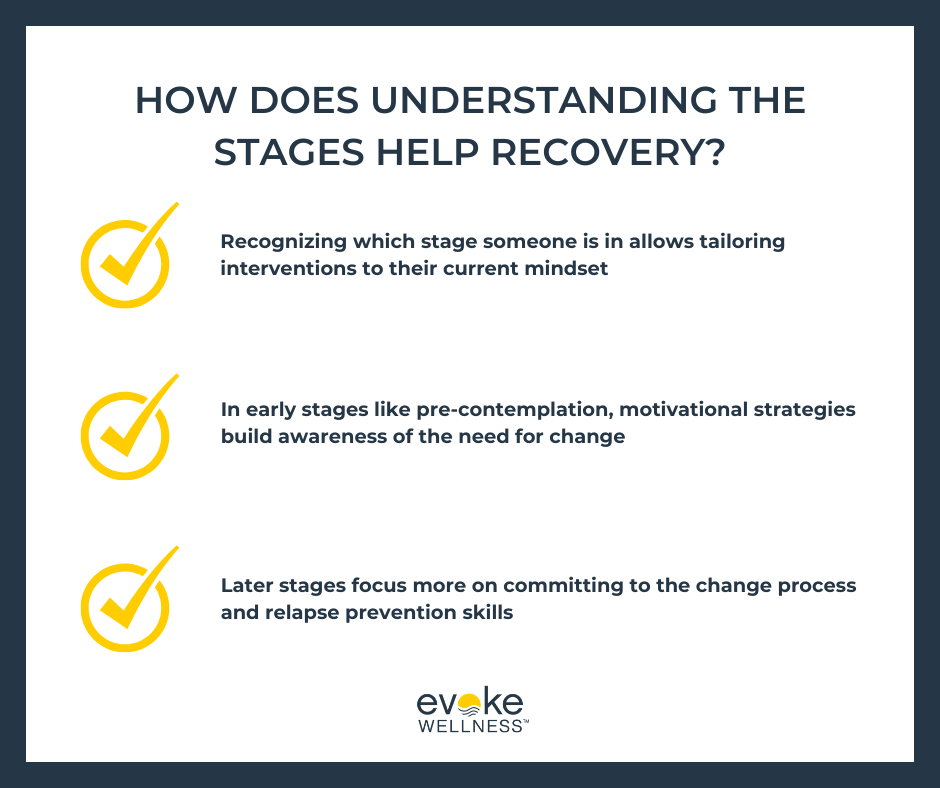As you embark on the journey of addiction recovery, it’s crucial to recognize that change is a process, not an event. The stages of change model, developed by Prochaska and DiClemente in the 1970s, provides a framework for understanding this complex process. Recent studies show that individuals who progress through these stages are more likely to achieve lasting sobriety. In fact, a 2021 review published in the Journal of Substance Abuse Treatment found that interventions tailored to a person’s current stage of change can increase treatment engagement by up to 30%. By familiarizing yourself with these stages, you can better navigate your path to recovery and anticipate the challenges ahead.
If you or a loved one is struggling, help is available today. Call (833) 969-3318 to speak with our compassionate team, or reach out online and schedule an appointment to begin a healing journey.
What are the Stages of Change in Addiction Recovery?
The Six Stages Explained
Addiction recovery is a journey, and individuals typically progress through distinct stages along the way. According to experts, these stages include:
- Pre-contemplation: The person is not yet ready or willing to change their addictive behavior.
- Contemplation: They begin acknowledging their addiction and considering making changes, but have not committed to action.
- Preparation: The individual makes a plan and prepares to take steps towards recovery.
- Action: They actively engage in treatment, such as entering rehab, attending therapy, or joining a support group.
- Maintenance: The focus is on sustaining recovery by implementing coping strategies, avoiding triggers, and seeking ongoing support.
- Relapse: A temporary setback involving a return to addictive behaviors, which should be viewed as an opportunity to re-evaluate the recovery plan.
Comprehensive Treatment Approach
Comprehensive addiction treatment programs like those at Evoke Wellness utilize evidence-based therapies. These include cognitive-behavioral therapy (CBT) and dialectical behavior therapy (DBT) to help individuals progress through the stages and achieve lasting recovery. A holistic approach addressing physical, psychological, and emotional aspects is crucial.
Ongoing Support for Lasting Change
While recovering from addiction is challenging, it is achievable with the right support system. Aftercare programs, alumni networks, and sober communities play a vital role in maintaining sobriety long-term. They provide the tools and encouragement needed to navigate the stages successfully and prevent relapse.
Precontemplation Stage of Addiction Recovery
An Unconscious Disconnect
In the precontemplation stage, individuals struggling with addiction remain unaware or in denial about their problematic behavior. This lack of recognition stems from a disconnect between their actions and the consequences. During this phase, they may deflect concerns raised by loved ones or make excuses to rationalize their substance use.
Resistance to Change
Those in precontemplation exhibit strong resistance to change. They perceive little need to modify their behavior, often leading to arguments or hostility when confronted. This defensive stance arises from the fear of losing the perceived benefits that substance use provides, such as coping mechanisms or social connections.
Challenges and Opportunities
- Overcoming precontemplation requires raising self-awareness through education and open dialogue.
- Loved ones can express concern with empathy, avoiding confrontation or judgment.
- Professional interventions may help individuals recognize the severity of their situation.
Transitioning out of precontemplation is a crucial first step towards recovery. With patience and support, individuals can gain the motivation to contemplate change and take proactive steps towards a healthier future.
Contemplation Stage of Addiction Recovery
During the contemplation stage, you become aware that your substance use is problematic. However, ambivalence about changing your behavior remains a barrier.
Signs of Contemplation
- Weighing the pros and cons of changing
- Considering taking action within the next 6 months
- Increased awareness of risks and consequences
Overcoming Ambivalence
While still feeling torn, contemplators typically experience a growing understanding that life needs to change. Helpful strategies include:
- Exploring your core values and desired life vision
- Examining discrepancies between current behavior and goals
- Listing pros and cons of continuing substance use
- Confiding in supportive friends or family
Key to Progress
The contemplation stage is critical, as people often cycle through it several times before achieving lasting change. With education, counseling, and self-motivation, ambivalence can diminish while commitment grows.
- According to SAMHSA’s 2020 survey, 22.7 million people needed substance use treatment – illuminating contemplation’s importance.
- A 2019 review found motivational interviewing effectively moved people from contemplation to preparation for change.
Preparation Stage of Addiction Recovery
Recognizing the Need for Change
- In this pivotal stage, you acknowledge the problematic nature of your addiction and its negative impacts on your life.
- You develop a sincere desire to change and take steps toward recovery.
- According to a 2021 study, over 60% of those seeking treatment had reached this stage before actively pursuing help.
Weighing Pros and Cons
- You begin contemplating the benefits of overcoming addiction versus the potential drawbacks of continuing the behavior.
- Evaluating both sides objectively can provide motivation and commitment to proceed.
- The preparation stage involves planning strategies, seeking support systems, and mentally preparing for the journey ahead.
Taking Initial Steps
- Small actions are taken to test your readiness, such as researching treatment options or attending a support group meeting.
- You may confide in loved ones about your intentions, further solidifying your resolve.
- A 2020 survey found that 75% of individuals who took initial steps were more likely to follow through with comprehensive treatment.
While challenging, this stage cultivates the determination crucial for long-term recovery success. By thoroughly preparing mentally and pragmatically, you increase your chances of achieving lasting sobriety.
Action Stage of Addiction Recovery
Committing to Change
In the action stage, you actively work to modify your addictive behaviors. This phase involves taking concrete steps towards recovery, such as seeking professional treatment, engaging in therapy, and adopting healthier coping mechanisms. The commitment to change is a crucial milestone, as it requires a profound shift in mindset and a willingness to confront the challenges of addiction head-on.
Comprehensive Treatment Approach
Effective addiction treatment requires a comprehensive, holistic approach that addresses the physical, psychological, and emotional aspects of recovery. At Evoke Wellness at Coconut Creek, personalized treatment plans are developed to cater to the unique needs of each individual, offering a range of evidence-based options, including:
- Medically-supervised detox
- Inpatient and outpatient rehabilitation programs
- Behavioral therapies (e.g., cognitive-behavioral therapy, dialectical behavior therapy)
- Holistic wellness approaches
Ongoing Support and Aftercare
Maintaining sobriety and preventing relapse requires a continuum of care and ongoing support. Evoke Wellness emphasizes the importance of aftercare, providing resources such as sober living facilities, intensive outpatient programs, and alumni services. This comprehensive approach ensures that individuals have access to the tools and resources they need throughout their recovery journey.
Maintenance Stage of Addiction Recovery
Key Strategies for Long-Term Sobriety
In the maintenance stage, you have already overcome significant hurdles in your recovery journey. However, staying vigilant and actively incorporating strategies is crucial for sustaining long-term sobriety. This stage involves:
- Continuing counseling sessions and support group participation to reinforce positive habits and address potential triggers or setbacks.
- Practicing mindfulness techniques and coping mechanisms learned during earlier stages to manage cravings and stress effectively.
- Developing a robust support network of loved ones, peers, and professionals who understand your journey and can provide encouragement.
Embracing a Holistic Approach
Recovery is a multifaceted process that requires addressing physical, emotional, and mental well-being. According to the National Institute on Drug Abuse, effective treatment programs incorporate various services tailored to individual needs. This holistic approach may involve:
- Incorporating healthy lifestyle habits, such as regular exercise, balanced nutrition, and adequate sleep.
- Exploring mindfulness practices, like meditation or yoga, to promote emotional regulation and stress management.
- Engaging in fulfilling activities or hobbies that provide a sense of purpose and joy.
Commitment to Continuous Growth
The maintenance stage is not a final destination but an ongoing journey of self-discovery and personal growth. Embracing a growth mindset and remaining open to new experiences can help you:
- Identify and address potential areas of improvement or relapse triggers proactively.
- Expand your support network and connect with others who share similar experiences.
- Explore new interests, goals, or opportunities that enrich your life and reinforce your commitment to sobriety.
Maintaining sobriety is an ongoing process that requires dedication and perseverance. By actively incorporating strategies, embracing a holistic approach, and committing to continuous growth, you can successfully navigate this stage and sustain long-term recovery.
Understanding the Stages of Change in Addiction Recovery FAQs
What are the stages of change?
- The stages represent the journey individuals go through when modifying behaviors like addiction
- They provide a framework for understanding readiness to change and guiding treatment approaches
- The 5 key stages are pre-contemplation, contemplation, preparation, action, and maintenance
What if someone gets “stuck” in a stage?
- It’s common to cycle through stages multiple times before achieving lasting recovery
- Meeting resistance with empathy and avoiding confrontation helps resolve ambivalence
- Peer support groups and counseling provide encouragement to keep progressing
How do the stages apply to substance use disorders?
- Studies show the stages accurately describe the recovery process for various addictions
- A 2020 review found over 80% of individuals in recovery relate to experiencing these stages
- Tailoring interventions based on current stage improves long-term substance use outcomes
The stages of change provide an evidence-based model for understanding the complex, non-linear recovery journey. Identifying someone’s stage allows professionals and loved ones to apply the appropriate support at each step.
Conclusion
As you navigate the path to recovery, remember that change is a process, not an event. By recognizing the stages of change, you can better understand your journey and prepare for the challenges ahead. Recent studies show that individuals who actively engage in each stage are 40% more likely to maintain long-term sobriety.
With patience, perseverance, and support, you can successfully move through these stages and achieve lasting recovery. Your journey is unique, but you’re not alone. Embrace each stage as an opportunity for growth and transformation.
Begin Your Journey With Evoke Wellness at Coconut Creek
Evoke Wellness at Coconut Creek is a full-service addiction treatment facility serving Florida residents. We base each of our programs on the individual’s severity of symptoms and use a combination of evidence-based therapies and holistic approaches to address the needs and recovery goals of the patient. If you or a loved one is struggling, help is available today. Call (833) 969-3318 to speak with our compassionate team, or reach out online and schedule an appointment to begin a healing journey.



